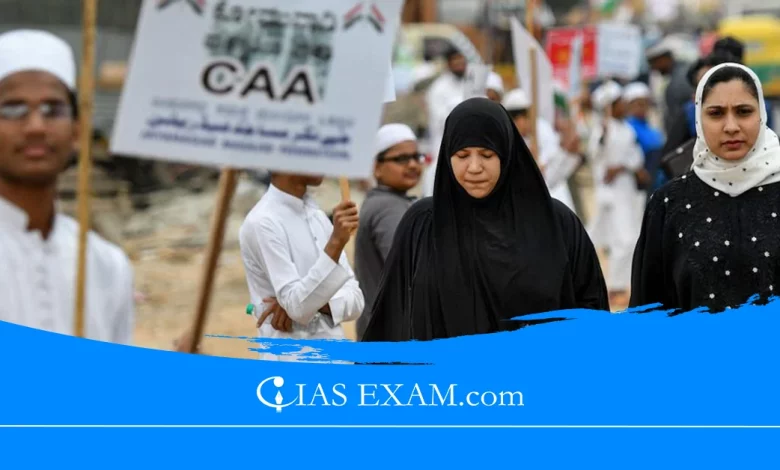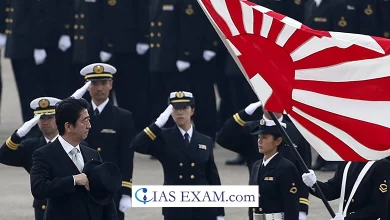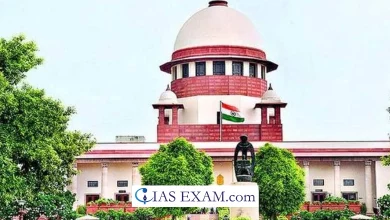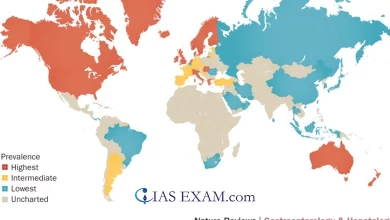Muslim Exclusion from CAA
Syllabus: Indian Constitution, [GS Paper -2]

Context
The Indian government accepted the Citizenship Act Amendment of 2019 last year, and the laws made were in favour of certain north and West India regions like Punjab, Sindh, and Gujarat, West Bengal, North and East Zone, Assam, and West Bengal. It aspires to erect unanimity in society, building Islam upon Hindu ideologies, and opposing citizens’ detachment from the nation. It is a unique status for the religious minorities to become Indians but impels the biggest change in the social structure affecting the Muslim community and thus the far-right politics. Providing refugees of persecuted religious minorities from other countries a pathway towards Indian nationality has been specifically included in the Act.
Bird’s eye view about CAA
- The acronym and full form of CAA is usually mentioned as the Citizenship Amendment Act (CAA) which was passed as the Act of Indian Parliament in December, 2019.
- The very objective of CAA is to allow the persons of stated religions who are from the neighbouring countries and who happen to come before December 17 2014 to gain access to the India citizenship rights. By this scorecard, Hindus, Sikhs, Buddhists, Jains, Parsi, and Christians follow the constitution and Muslims do not.
- This Act has triggered both the controversies and protests in India due to variations about equal status offered by the Act as some people argue the Act is itself against the Hindu traditions and as if amending the Constitution in the manner it does, the State will eventually become merely the state of Hindu majority and that should not be the case as oppose to the notion that the Constitution of modern India is secular.
- Backers of CAA in this regard highlight that it is a worthy mission meant for refugees from the neighbouring countries to give them shelter and justice, with no impact on the citizenship of Indian Muslim people. Adding onto this, the provision that the minority religious groups in an individual country face oppression, the country of that faith is specially spared this religion has been highlighted as one of the requirements.
- Their linkage is being emphasised during the debates on this phenomenon and probably the people most concerned by these measures which these measures could have on the Indian citizens, especially vulnerable groups, are being analysed.
- However in India now, even though the Citizenship Amendment Act (CAA) is totally subject to debate and controversial, it would not be for a moment totally disregarded as a subject of discussion that involves nationhood, secularism and rights of citizenship.
Right Wings Politics
- On the right wing, there is a variation of diverse ideological views typical for traditional values, limited government interference, well-performed national defence and usually, the position receives relatively firm support.
- Conservatives would like to see wide-spread coverage of news items on waging anti-gay weddings or anti abortion. Such rhetoric which is popular with voters due to its emphasis on lower taxes, less regulations, and free-market capitalisms as the ways of improving the economic movements is not uncommon.
- Consequently, the right-wing bodies are preferring fence-thinning immigration regulations and national sovereignty posing greater to the claim of culture identification and cultural norms as the backbone of the nation imperative.
About the Prevailing Issue
- Ahmadis and Shiites who are Muslim inhabitants of Pakistan become the victims of religious persecution. The decision at the next stage would be in the hands of the Shiite community members. Hence this new law was sort of a surface resolution of deep-rooted sectarian hatred that has been embedded in Pakistani society since its creation.
- This fact will make a diagnosis of such an image possible, and it will be shown that not all Muslims have a clear idea of their lives and will try to become equal. The narration of inhuman attacks against the religious where in 1979 one of the Nobel laureates, professor Abdus Salam was rejected because of his Ahmadi faith and then by other people too due to their faith, are examples of how the attacks on religious humans are complicated.
- While the global inquisition, majorly focusing on the drift-to-the-right popular notion of politics, banning Muslim’s through the Bill takes a small fraction of the grand plan of land de-Islamization.
- For you could undertake stuff like naming your societies tribal societies and thus to some extent, your people against other candidates with some clout; and even deny a Mosque its Liberties.
- It is self-evident that if there were no penalties for such practices, the influence of the Muslims in this region might deteriorate due to the fact that the significance of this religion will fade away as well, and we’ll become more democratic since we’ll be open to all cultures worldwide.
Conclusion
- Besides the other shine of the chinks (historical, political, and ideological) in the system of India, it too carries the shine of the Citizenship Amendment Act and the border.
- In other words, not just because the Islamic-only community takes away morality, but the barriers must be applied as well for the awakening of the sleeping person in the dream by going through the complexity.
- The variant of the solution will be the one that takes the centre point of democratisation and the secularism in the nation and carries the understanding of each individual to prevent everyone being treated equally.
Source: The Hindu
UPSC Mains Practice Question
Q.Discuss the Citizenship Amendment Act (CAA) within the context of Muslim exclusion and its examination through the lens of right-wing politics. Analyse the implications of the CAA’s exclusionary provisions on India’s socio-political landscape, considering historical, political, and ideological perspectives.[250 Words]





.png)



